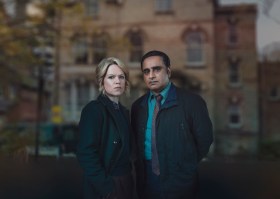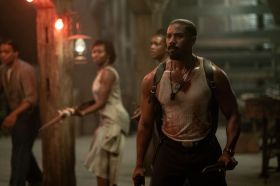Nothing if not economical, Locke starts with a short title, a solo protagonist and a single setting, and doesn’t relinquish its underlying simplicity. On screen, it follows a man making phone calls on an evening drive from Birmingham to London, dealing with personal and professional crises. Off screen, the film evolved from idea to cinema in just nine months. Of course, like all things seemingly straightforward, both the finished product and its construction are predicated on elements much more complex.
Dedicated at home and work, Ivan Locke (Tom Hardy, The Dark Knight Rises) has a happy middle-aged life, as conversations with his wife, two sons, and a roster of colleagues clearly outline; however the reason for the many discussions en route away from all he knows also paints a different picture. The news the building site foreman has to share as he juggles an upset family and an irate boss is far from welcome, breaking plans to watch a soccer game and abandoning his post overseeing the biggest concrete pour in history. Arguments with an unhappy co-worker (Olivia Colman, Cuban Fury), as well as updates from a series of hospital staff, help fill in the gaps.
As a director, Steven Knight has made just one film prior to Locke, the scarcely released Redemption; as a writer, he has penned the screenplays for Closed Circuit, Eastern Promises and Dirty Pretty Things. That combination of helming inexperience and narrative proficiency fuels his sophomore production, gifting the feature with aesthetic ambition as well as tight, terse scripting. Each are employed to expand the space and uncertainty surrounding the titular figure, all as he keeps closing himself into his problematic predicament. The road reaches out before the shiny BMW, shot with a glistening night-time sheen and seen through windscreens and mirrors; every ring of the phone and resulting conversation adds further layers to the tale, and more queries; their culmination depicts the fleeting freedom that once was for someone now trapped by their own choices.
It is impossible to forget that a grand tradition of one-location films has paved the path for Knight’s increasingly claustrophobic effort, ranging from Hitchcock classics Lifeboat, Rope and Rear Window to the more recent Cube, Phone Booth and Buried, all company to which Locke does ample justice. Of course, key in each is the mixture of minimalism and ambition that speaks to unseen depths. What is intimated and how it is orchestrated is complicated, but constantly appears otherwise. The pressure that the movie derives from the contrast starts slow and subtle, soon becoming forceful and formidable.
In keeping with its thematic compatriots, Locke rises and never falls thanks to the strength of its central performance from a Welsh-accented Hardy, ever the cinematic chameleon. As the only presence seen within the film’s frames, it is into his eyes the audience stares when things get tense, and his furrowed brow they must look on as the façade of his perfect existence begins to crumble. His manner is always sturdy and constantly controlled, yet remains an excellent embodiment of his character’s gamut of reactions to the escalating situation. Excellent voice work from the remainder of the cast, including Ruth Wilson (Saving Mr. Banks), Andrew Scott (TV’s Sherlock), Tom Holland (How I Live Now) and Bill Miner (Broken), aids in ensuring each chat isn’t a one-way affair, but with Hardy the strong centre of the storm, there’s never any question as to whose side the film falls on.
Rating: 3 ½ out of 5 stars
Locke
Director: Steven Knight
UK / USA, 2013, 85 mins
Sydney Film Festival
www.sff.org.au
4 – 15 June
Revelation Perth International Film Festival
www.revelationfilmfest.org
3 – 13 July
Melbourne International Film Festival
www.miff.com.au
31 July – 17 August
Actors:
Director:
Format:
Country:
Release:





